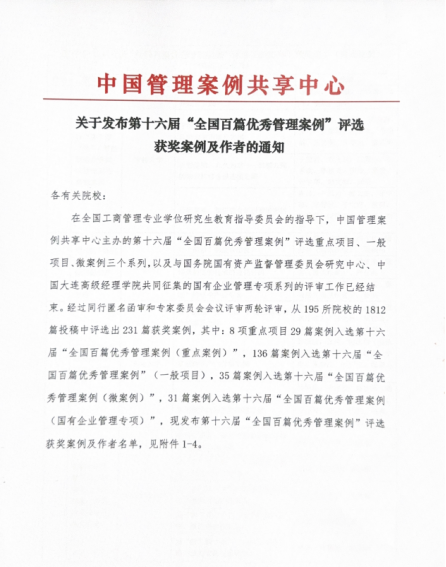Three Cases from the School is Selected into the "National Top 100 Excellent Management Cases"
2025-09-25
Recently, the selection results of the 16th "National Top 100 Excellent Management Cases" were announced, which was hosted by the China Management Case Sharing Center under the guidance of the National Steering Committee for Postgraduate Education in Business Administration. Since the launch of this special selection, a total of 1,812 submissions from 195 institutions across the country have been received. After two rounds of expert review, three cases developed and written by the School of Business were successfully selected, namely Loyalty or Defection: How to Resolve the Entrepreneurial Defection of the Management Team at Action Education (General Project), Decathlon Yanglou’s Dilemma: Should the Retirement Pension Subsidies Continue? (Micro-case), and White Rabbit’s Brand Management: Long-term Paradigm or Hotspot Paradigm? (State-owned Enterprise Management Special Project).

Introduction to Excellent Management Cases
Loyalty or Defection: How to Resolve the Entrepreneurial Defection of the Management Team at Action Education?
Written by CHEN Wansi and WANG Tao
As an important form of knowledge spillover, employee turnover for entrepreneurship is a key source of technological entrepreneurship and industrial diversification. However, the "defection" of key employees, especially members of the core management team, causes profound and long-lasting harm to enterprises and impacts their subsequent business activities. This case focuses on Action Education, which encountered the entrepreneurial defection of the business leader at a critical moment when it was making strategic decisions about the future development of its digital business school. It emphasizes the motivations behind the management’s entrepreneurial defection and the far-reaching impact of this incident on the company’s operations and strategy implementation. The case aims to guide students to enhance their ability to understand, process, and apply information while in-depth exploring and analyzing the characteristics, driving factors, and consequences of entrepreneurial defection. Through open discussions on how Action Education can avoid similar incidents in the future, it cultivates students’ ability to apply theories to practice and make rational decisions.
Keywords: Action Education; digital transformation; entrepreneurial defection
Decathlon Yanglou’s Dilemma: Should the Retirement Pension Subsidies Continue?
Written by CHEN Wansi, HOU Limin, and WANG Tao
Against the macro background of slowing global economic growth and the prolonged downturn in the construction industry, this case focuses on the decision-making dilemma of Decathlon (Suzhou) Yanglou Co., Ltd.—an industry benchmark with wooden building construction as its core business. Facing the operational difficulties of a sharp decline in large orders and cash flow pressure, the company needs to decide whether to continue the retirement pension subsidy policy for lifelong retired employees, which has been implemented for more than 10 years. The case aims to enable students to deeply understand the multi-dimensional influencing factors behind salary and welfare decisions and the importance of their sustainable development, on the basis of mastering the composition and design principles of salary and welfare systems. Meanwhile, it guides students to recognize that enterprises are not merely organizational entities pursuing economic interests, but also bear the responsibility of caring for employees and contributing to social development. In today’s era, the dilemma faced by Decathlon Yanglou highlights how enterprises can balance long-term welfare commitments to employees and social responsibility while ensuring their own survival and development amid the complex and changing external economic situation, which provides important reference for other enterprises.
Keywords: Decathlon Yanglou; construction industry; retirement pension subsidies; salary and welfare system; sustainability of salary and welfare
White Rabbit’s Brand Management: Long-term Paradigm or Hotspot Paradigm?
Written by DU Weiyu and YU Ping
This case focuses on the development and integration of White Rabbit’s brand management paradigms, emphasizing the process of its hotspot brand management and exploring how it balances the adherence to long-term value and innovation in hotspot marketing. Since its establishment in 1959, White Rabbit has built a long-term brand management paradigm through process improvement, cultural narration, trademark protection systems, and product innovation, laying the foundation for its status as a national classic milk candy. In recent years, White Rabbit has launched cross-border collaborations, rolled out products such as lip balms and trendy figurines, gradually becoming a leader in fashion trends and establishing a hotspot brand management paradigm, which has successfully revitalized this time-honored brand. This case helps students think about how to conduct brand management under the two different paradigms of long-term and hotspot, and provides reference for enterprises facing similar brand management paradigm choices.
Keywords: brand management; long-term brand management; hotspot brand management; brand collaboration
